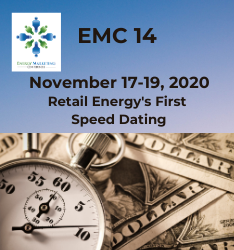|
|
|
|
|
Retail Suppliers Say Proposed Requirement That Would Pay Bundled Products Last Under Supplier Consolidated Billing Would "Punish" Suppliers, Jeopardize Success Of SCB
The following story is brought free of charge to readers by EC Infosystems, the exclusive EDI provider of EnergyChoiceMatters.com
Retail suppliers opposed several measures relating to the treatment of bundled products in draft Maryland rules for supplier consolidated billing (SCB), warning that such rules would jeopardize the success of the SCB program
EnergyChoiceMatters.com was first to report the draft SCB rules, including requirements that, for a bundled product, the supplier shall, "[d]isclose on a customer’s contract the percentage of the product that shall be treated as commodity versus non-commodity for payment posting," and, in a Staff recommendation, treat all bundled products as non-commodity and move them to last in the order of payment
In joint comments, NRG Energy, Inc.;
Interstate Gas Supply, Inc. d/b/a IGS Energy; Just Energy Group, Inc.; Direct Energy Services,
LLC; ENGIE Resources LLC; and Vistra Corp. (the "supplier petitioners") noted that, "In the proposed COMARs, Staff would treat all bundled products as non-commodity and
move them to last in the order of payment. This proposal threatens suppliers’ ability to offer
bundled products and increases a supplier’s risk of participating in the SCB program."
"[T]he bundling issue is complex and is nowhere near as simple as the
proposed COMARs would make it appear. It cannot be boiled down to 'separate the commodity
from the non-commodity' cost of the product. Yet, the proposed COMARs attempt to treat
bundled products in this overly simplistic manner and make it difficult to market the product and
then punish the SCB suppliers who offer them by treating the entire electricity service charge as
a value added product to be paid last in the payment posting system," the supplier petitioners said
"Petitioners have been very clear that resolving this issue in a workable manner for
supplier is critical to the overall success of the entire SCB program. Staff’s proposal is therefore
inconsistent with the language in the Order that SCB should be designed to encourage these
products, not stifle them. For example, the Order provides that 'SCB should facilitate the
development of these innovative products and pricing plans and increase the number of
Maryland households that shop for residential electric and gas supply offerings.' The
Commission also recognized that 'suppliers have become more sophisticated in new product
development, customer research, and processing and communication of energy usage data.'
Adopting the proposed COMARs thwarts SCB suppliers’ ability to offer innovative and creative
products and services while at the same time significantly increasing suppliers’ risk of
participating in the SCB program. Simply put, to stand a chance of a successful SCB program,
the Commission should refrain from implementing marketing and payment posting rules this
unfriendly to bundled products," the supplier petitioners said
The supplier petitioners would delete proposed COMAR 20.53.07.09.A(2)(c) and 20.59.07.09.A(2)(c), which require the SCB supplier to
disclose, when providing non-commodity products with the commodity, "the portion of the
product that shall be treated as the supplier commodity charge for payment posting."
"This
requirement ... puts Maryland SCB suppliers in the untenable and
impossible position of disclosing the 'portion' of the product that will be treated as the
electricity supply service for payment posting," the supplier petitioners said
The supplier petitioners said, "Petitioners further disagree with Staff’s assertion that identifying the portion of a price
that is 'commodity' provides more transparency to consumers. Suppliers will still provide a
price per unit (kWh, Therm, etc.) wherever required and they will also disclose any additional
value the customer will receive for the price they pay. Customers can compare that price to the
SOS or SS price if they want to. But, the essence of the bundled price is that the customer is
purchasing energy and any associated benefits. The customer is free to decline to choose that
product at that price. If the price is too high, the customer can keep shopping for other products
from that supplier, move on to another supplier, or stay put. Staff’s assertion that an unbundled
price would allow customers to 'better compare commodity rates among each other' is simply
false. Customers will have all the information they need to compare prices."
The supplier petitioners also oppose the proposed COMARs’ treatment of bundled products for purposes of
the payment posting system. "In its narrative, Staff offers two solutions, both unworkable and
which, as Petitioners have explained in no uncertain terms, jeopardize the entire SCB program.
Specifically, the proposed COMARs would treat a bundled product as a non-commodity product
which would be moved to last in the payment pecking order. Staff also suggests that the
Commission establish a proxy price 'based on SOS or market prices with an adder [that] is used
to determine how much of the charge can be treated as a commodity for payment posting.'"
In separately filed comments, WGL Energy Services, Inc. also opposed the draft's approach to bundled products, stating, "A rule that bundled products be last on the payment posting structure would operate as a disincentive for suppliers to offer such products, because the rule would place suppliers at greater financial risk of recovering their costs. Such bundled products may come at a greater cost for the supplier to provide, even though the product seeks to satisfy the customer’s needs through such innovative product types and services."
The Maryland Energy Administration filed comments stating similar concerns to those of the suppliers
"MEA encourages the Commission to continue to allow bundled products within the competitive market under SCB, just as they are permitted under UCB, without requiring the itemization or distinction that is currently included in draft regulations 20.53.05.12(B)(5) and 20.53.09.02(B)(14)," MEA said
The Office of People's Counsel support the unbundling disclosure and payment posting rules as draft
"OPC supports mandating that the commodity component of bundled prices included on an electric or natural gas bill be disclosed to customers as proposed by Staff," OPC said
OPC also said that an unbundled price is required so that the customer may compare the rate to the Price to Compare. OPC noted that in ordering SCB, the Commission has already said SCB customers shall receive the Price to Compare on their bills.
"OPC opposes any SCB practice that would prevent customers from making this price comparison. In the interest of transparency and disclosure, OPC recommends that the Commission direct SCB providers to clearly present these utility supply price comparisons and SCB prices in a way that makes it easy for customers to compare the two against each other," OPC said
OPC also expressed general concerns about SCB, stating, "Because utilities must necessarily maintain their existing billing capability, and because suppliers providing SCB will necessarily need to incur the costs of maintaining duplicative billing capabilities, consumers choosing SCB will end up paying for these costs twice. When exercising its ratemaking authority, the Commission takes great care to ensure that the costs of a regulated utility’s operations – including billing and call center expenses—are reasonable and prudent before approving their inclusion in the distribution rates customers pay for service. Assuming both that the resulting Commission-approved rates have appropriately 'priced' the costs of a utility’s billing operations, and further that the customer will continue to pay for those operations even when served by an SCB provider, the question becomes how can an SCB supplier provide economic value to customers that choose SCB?"
OPC believes that the Commission should prohibit the outsourcing of call center or billing functions by suppliers using SCB to third-party agents
OPC also favors a scalable bond for SCB suppliers, tied to the level of potential harm that could be caused by a supplier’s licensed business activities (annual sales or numbers of customers served), rather than a flat amount such as the incremental $250,000 proposed in the draft
The supplier petitioners expressed concern about SCB customers in arrears paying only utility charges to avoid termination and switching suppliers to avoid paying supplier charges
The supplier petitioners stated, "Petitioners are also concerned about
customers who exhibit a pattern of being dropped for nonpayment, paying their utility charges,
and then enrolling with a new SCB supplier. Petitioners had proposed in the working group that
utilities, who will have this information, report data on this issue periodically. That requirement
was not included in the proposed COMARs. Petitioners propose to add language to COMAR
20.53.04.02.H and 20.59.04.02.H to preserve the Commission’s ability to implement future
switching requirements to address such instances: 'G. The Commission may impose additional
switching requirements for a customer who is dropped by a supplier for non-payment.'"
Case No. 9461
ADVERTISEMENT Copyright 2010-20 Energy Choice Matters. If you wish to share this story, please
email or post the website link; unauthorized copying, retransmission, or republication
prohibited.
October 13, 2020
Email This Story
Copyright 2010-20 EnergyChoiceMatters.com
Reporting by Paul Ring • ring@energychoicematters.com
NEW Jobs on RetailEnergyJobs.com:
• NEW! -- Director of Regulatory Affairs -- Retail Supplier -- Houston
• NEW! -- Energy Pricing Analyst -- Houston
• NEW! -- Retail Energy Account Executive -- Houston
• NEW! -- Sr. Sales Executive -- Retail Supplier
• Energy Systems Analyst -- Retail Supplier
|
|
|
|









